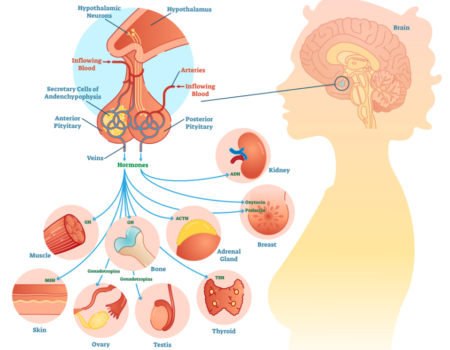Overview
Our Endocrinologists can detect, evaluate and treat conditions related to the adrenal glands or pituitary glands. This requires unique training and experience, in part because symptoms of such conditions can be so diverse and disseminated that they often resemble those attributed to stress, diet, aging and other factors. While not considered common, these endocrine conditions are nevertheless underdiagnosed, and they have profound effects on an individual who suffers from them:
Adrenal and pituitary expertise is a complex, inter-related area of knowledge that is the special domain of the endocrinologist.

Adrenal Disorders
Adrenal glands produce hormones the help the body control sugar, burn protein and fat and react to stressors. These hormones have a very long list of vital effects, including on the immune system, on insulin function and on dietary metabolism.
Addison’s Disease or adrenal insufficiency. When the adrenals don’t produce an adequate amount of the hormone cortisol (and in some cases aldosterone), the result can be weight loss, muscle weakness or cramps, fatigue, low blood pressure, nausea and other effects. Kidneys of patients with this condition may not be able to regulate salt and water balance. Blood tests, including for cortisol levels, help to reveal the disease. This chronic condition can be safely treated with daily dosing of replacement hormones–a therapy that must be carefully managed by the endocrinologist.
Cushing’s syndrome. Elevated production by the adrenals of cortisol over an extended period of time can cause obesity and other physical changes, as well as well changes in strength, energy and metabolism. Pituitary tumors often cause the condition.
Aldosteronism. Overproduction by the adrenals of aldosterone results in water build-up and increase in blood pressure. Medications to block the effects of aldosterone, and lifestyle changes, can effectively treat this condition.
Pituitary Disorders
A tiny gland situated below the brain in the skull base, the pituitary produces a list of important hormones that help to control and set off a cascade of additional, essential endocrine effects in the body. Pituitary hormones are thus very important to endocrine function and health. They include: growth hormone; luteinizing hormone and follicle stimulating hormone, prolactin, thyroid stimulating hormone, adrenocorticotropic hormone, anti-diuretic hormone and oxytocin.
Pituitary tumors. These abnormalities are not cancers but are overgrowths. They can cause a number of conditions related to excess secretion of pituitary hormones, which in turn is responsible for most cases of overproduction of other hormones in the body. But comparison, non-endocrine tumors (nonsecretory pituitary gland tumors) proximal to the pituitary can be problematic because they may compress and decrease the function of the gland. Pituitary tumors can cause other effects due to pressure against other areas of the brain, as well. These conditions need highly knowledgeable and subspecialized care, often involving neurosurgery.

